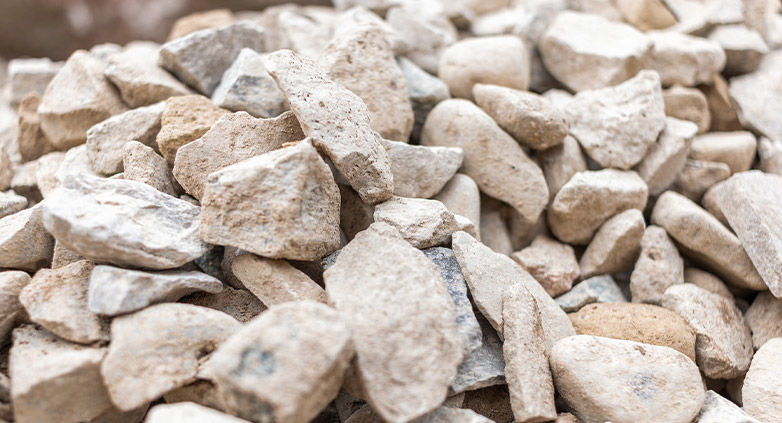Limestone Driveway – Pros, Cons and Installation Guide
Discover the natural charm and durability of limestone driveways, a unique and budget-friendly option for enhancing your home’s exterior with its distinct aesthetic and practical benefits.
Limestone driveways offer a blend of natural beauty and practicality. Made from calcium carbonate, these driveways provide a unique look with different grades and patterns. Ideal for various uses, they ensure effective water drainage, ground stabilization, and erosion control. Their ease of installation, with larger pieces at the base and smaller on top, contributes to their growing popularity among homeowners.
Learn more about the advantages and considerations of choosing a limestone driveway for your home, including insights into cost, maintenance, and installation techniques.
Crushed Limestone Driveway Pros
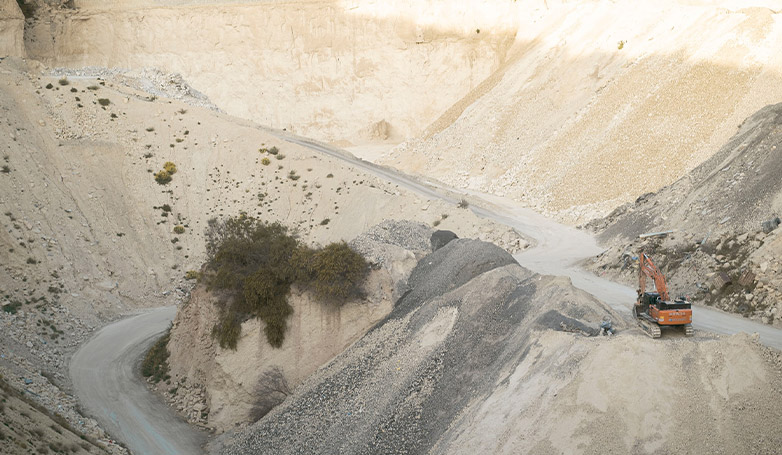
Limestone crushed is beginning to gain ground in the United States. This material comprises good-quality calcite (calcium), phosphor, copper, and magnesium. Because of its nature, it offers a charming traditional look to driveways and other outdoor landscaping.
Ideal for driveway installation, and when it’s not the main paving material, it acts as a base material for tarmac and concrete slabs or used in railway tracks. The use of crushed limestone is not enough to tell you how great it is for driveways; below are some of the benefits you should consider before deciding on this material for your home or commercial driveway.
Affordable
Cost! The one reason many homeowners settle for less. As a natural paving material, it’s inexpensive, readily available, and durable. Rest assured, staying within your budget becomes worry-free. These earthly rocks are not only common but also cost-effective.
Durable
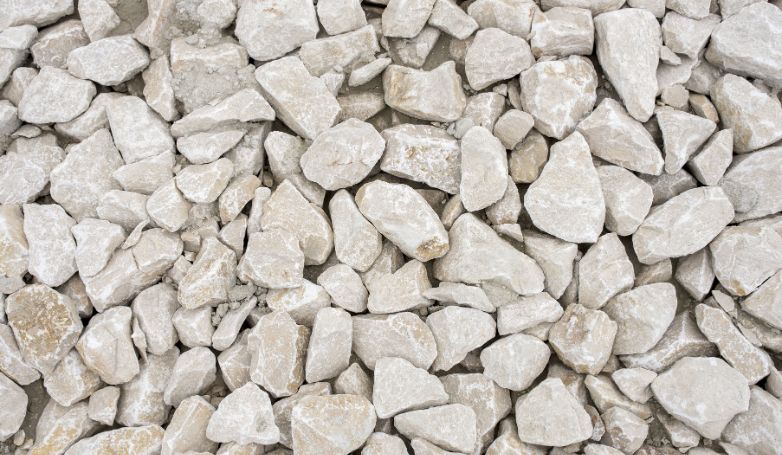
When considering a paving material for your driveway, you should use a material that can withstand extreme weather and harsh substances. Crushed limestone is long-lasting and harder than most stones you will find around. This material stays in place when properly installed until you decide you need a change. You wouldn’t want to go through the stress of having to install another paving material for your driveway after only a few years.
Versatility At Its Peak
This type of material comes in uniform colors, different sizes, and even patterns. Additionally, serving as a base for installing concrete and other paving materials or as a top layer for gravel driveways, limestone opens up possibilities beyond just driveway paving. Explore options like paving your patios with this versatile material.
Easy To Install
Ideal for driveways with numerous benefits, this paving material ensures a DIY project without leaving you fatigued all day. Moreover, if time is scarce for driveway maintenance, opting for this material allows for quick installation. Limestone rocks exhibit durability against heavy traffic and maintain a tidy appearance for an extended period. Doubt not; worry less with this reliable choice.
Crushed Limestone Driveway Cons
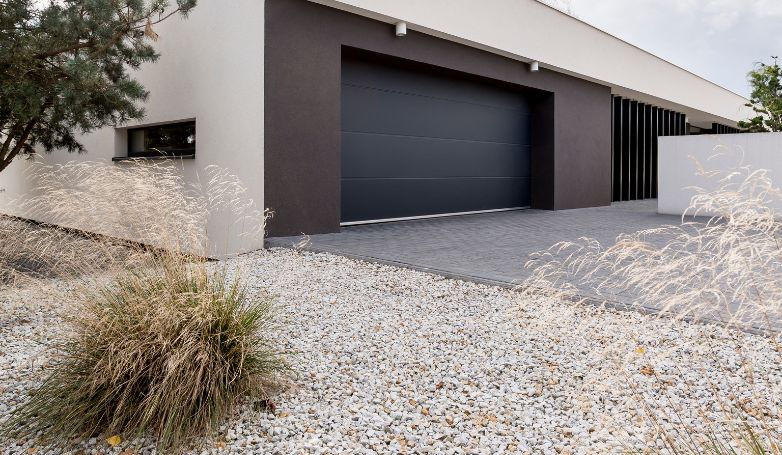
A crushed driveway is a better option for homeowners trying to improve the value of their homes or property. It’s also an alternative way to live an eco-friendly lifestyle without spending so much on your driveway. Some of the setbacks of the crushed limestone driveway include:
Frequent Maintenance
Your limestone rock driveway may require frequent removal of debris, leaves, and other dirt if you are looking for a hundred percent maintenance-free driveway. Crushed limestone isn’t the best option for you.
Lose Stones
The major setback with a crushed limestone driveway is that you will have some stray stones everywhere when someone drives in and out of your driveway. If you don’t mind gathering them and moving them back to your driveway, you have no problem installing your crushed limestone.
How To Build a Limestone Driveway in 5 Steps
The beautiful thing about limestone driveways is that you can easily install them yourself. However, installing your limestone rock driveway will consume your time and energy, especially if you do it alone and need more tools to complete the job easily. Hiring a professional driveway constructor will take the stress away from you. Installing a limestone driveway requires technical know-how and meticulous planning to complete the job. Below is a step-by-step guide that will help you accomplish your task or give you an idea of what has to be done to install a crushed limestone driveway.
1. Mark The Area
Kick off your limestone driveway project by first marking out where it’s going to be. It’s like drawing your dream driveway right onto the ground! Grab some stakes or landscape marking paint and sketch out its shape and boundaries. Think about making it a bit wider in places where you have curves or walls – it’s like giving yourself a little extra elbow room and making sure everyone stays safe. This bit of extra space is super handy, especially in spots where there’s a lot of walking or driving happening.
2. Dig The Soil
Time to roll up your sleeves and get digging! Bring in a small bulldozer or something similar to scoop out the top layer of soil in the area you’ve marked. This isn’t just busy work – it’s what makes sure your driveway has a solid base and stays put for years. How deep you go with the digging depends on a few things like the type of soil you have, how you’ll use the driveway, and your local weather. Usually, about 8-12 inches should do the trick. And hey, don’t just toss that soil – it could give your garden or other parts of your landscape a new lease on life!
3. Leveling
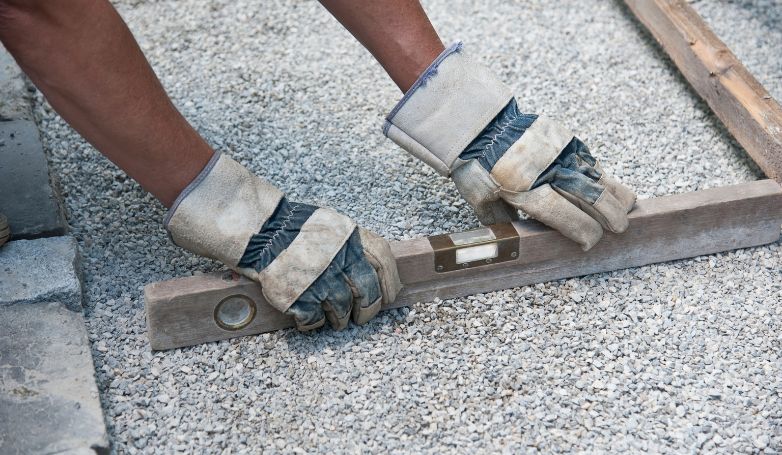
Once you’ve cleared away the topsoil, it’s time to smooth things out. A nice, level base is what we’re aiming for here. You can do this with a grading tool or something similar. If you’ve got a heavy vehicle handy, driving it back and forth over the area is a great trick to compact the soil. This step is super important – it keeps your driveway from settling unevenly and makes sure rainwater drains off like it should.
4. Cover the Base With Weed Fabric
With your base all smooth and level, the next step is to roll out some weed barrier fabric. This is like a shield, keeping those pesky weeds at bay and helping to stop the soil from eroding underneath your driveway. Once that’s down, pile on a 4-5 inch layer of crushed #1 or #2 limestone rocks. This isn’t just throwing rocks down; you’re building the main support for your driveway. Make sure those rocks are really packed in there – a heavy tool or a compactor can help with that.
5. Add Crushed Limestone
Now for the grand finale – adding a layer of #8 crushed limestone, about 4-5 inches thick. This is the stuff that makes your driveway not just sturdy, but also nice to look at and walk or drive on. Get that limestone spread out evenly – a scraper blade can be your best friend here. And here’s a pro tip: shape the limestone so the middle of the driveway is a tad higher than the edges. This isn’t just for looks; it’s all about good drainage, keeping water from pooling and making your driveway last longer.
What Is the Size Of Limestone Best For a Driveway?
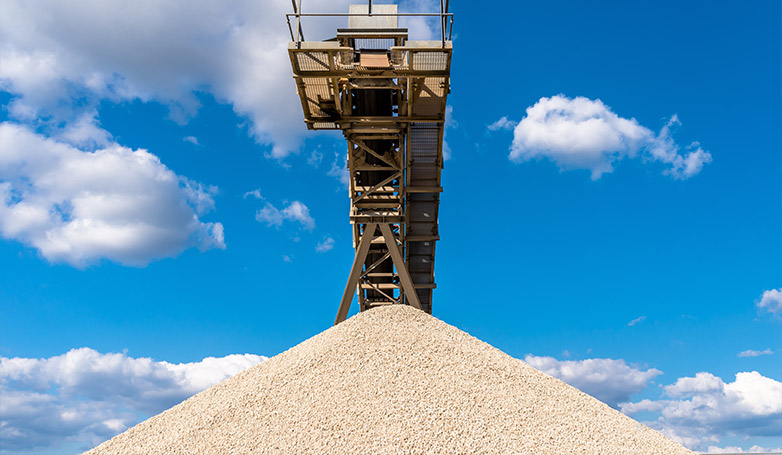
The precise size of the limestone you need depends on the application. Heavy-duty or traffic driveways will require 2-3 inches to support the driveway perfectly. The ½ inch option is perfect for a topcoat driveway, and for driveway base stone, 3 inches is the right size you need. If you use crushed limestone as aggregate for concrete or asphalt driveways, ½ crushed limestone is good enough. It’s important to note that the thinner you go, the more maintenance is required to keep your limestone driveway in place.
How Much Limestone Do I Need For My Driveway
You can tell from the size of your driveway whether you need a small amount of crushed limestone or more. Also, a few other factors will decide the amount of crushed limestone your driveway or parking lot will consume. These include whether or not your driveway or parking lot aggregate was installed in it previously. When your driveway already has aggregate installed, it will consume less crushed limestone. 2-3 inches of additional crushed stone will cover your limestone driveway. Without any previous aggregate, you will need at least 4-6 inches installed to reach an appreciable level.
Limestone Driveway Cost
| Quantity | Cost per Yard | Cost per Ton |
|---|---|---|
| Bulk Purchase | $30 – $40 | – |
| Small Scale | – | $25 – $35 |
So, you’re thinking about a limestone driveway and wondering about the costs, right? Well, here’s the lowdown. When it comes to buying crushed limestone, how much you buy at once can really make a difference in what you’ll spend.
If you’ve got a big driveway project or a large area to cover, going for bulk purchases is your best bet. Typically, the price for bulk limestone hangs around $30 to $40 per yard. It’s a smart move for those larger jobs – you end up saving some cash and you get a nice, consistent look in terms of quality and color across your entire driveway.
But what if you’re working on a smaller scale? Maybe you’ve got a cozy little driveway or just need to do some touch-ups here and there. In cases like these, you might find yourself paying a bit more – we’re talking about $25 to $35 per ton. It’s a bit pricier, but it’s perfect when you don’t need heaps of material and just want to focus on specific areas.
FAQs about Limestone Driveway
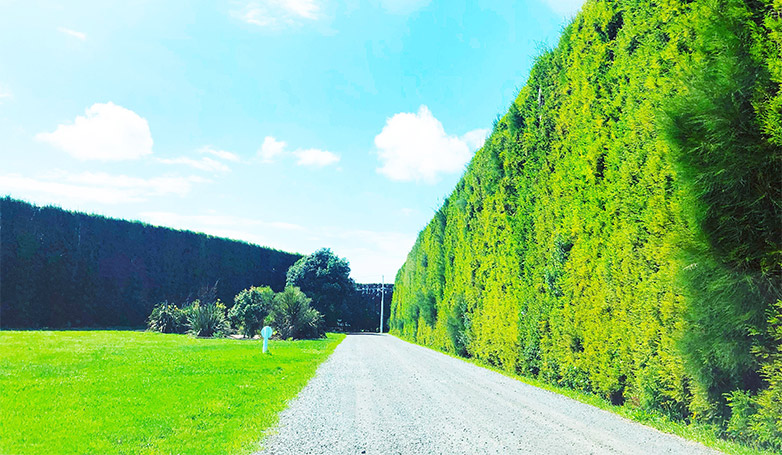
Wondering if a limestone driveway is right for your home? Let’s dive into some of the most common questions people have about limestone driveways, covering everything from cost comparisons to installation specifics.
Is limestone more expensive than gravel?
When it comes to cost, limestone typically comes in a bit higher than gravel. The reason? Limestone offers a more refined and uniform look compared to the mix of different stone types and colors found in gravel. However, it’s not just about looks – limestone also tends to be more durable and long-lasting. So, while you might spend more upfront, its durability could save you money in the long run on maintenance and replacements.
How thick should a limestone driveway be?
The thickness of your limestone driveway should ideally be about 4-5 inches. This thickness is crucial for providing a stable base that can support regular vehicle traffic without shifting or sinking. Remember, the base layer is just as important – it should be made of larger, crushed stones and be around 8-12 inches thick to ensure proper drainage and stability.
Is limestone cheaper than concrete?
This one can be a bit tricky. Generally, limestone can be more cost-effective than concrete, especially if you’re considering the long-term maintenance costs. Concrete, while initially cheaper, can crack over time and may require more frequent repairs or resurfacing. Limestone, on the other hand, offers a natural, more durable surface that requires less maintenance over time. Plus, limestone driveways can be easily repaired by adding more crushed limestone, whereas concrete repairs can be more complex and costly.
Which Is Better, Gravel or Crushed Limestone?
Depending on the function of your driveway, you can choose between gravel and crushed limestone. Unlike crushed limestone, which is more uniform in color, gravel is a loose mixture of different stones. It is versatile and inviting. However, gravel is a rounded stone and easily shifts when applying pressure.
Some other factors like location and rock size might affect your choice of construction material. If you live in an area where limestone is more available, it is your best option because it will be more affordable.
Limestone comes with wider stone sizes than gravel. You can choose the safest grade for your driveway and ensure it’s packed well. For a proper drainage system, a heavy-duty driveway, and stability, limestone is a better option than a gravel driveway.
Conclusion
Designing and installing a crushed limestone driveway is a great option for budget-minded home or business owners. A crushed limestone driveway is appealing and less expensive than a concrete or asphalt driveway. To install your limestone driveway yourself, purchase all the tools you need on home depot or get a professional paver to do it for you.

